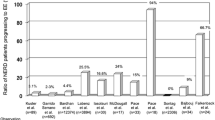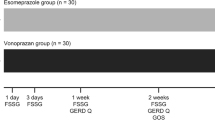Abstract
Complete remission of symptoms and prevention of symptomatic recurrence are among the main therapeutic aims in gastro-oesophageal reflux disease (GORD). In this context, a potent pharmacologic inhibition of gastric acid secretion plays a central role. The goal of antisecretory treatment in GORD is to maintain an intragastric pH greater than 4.0 for the longest possible time. This is best achieved by the administration of proton pump inhibitors (PPIs). Tolerability and safety of different PPIs are similar and consistently high, but therapeutic efficacy may differ among them. Esomeprazole appears to achieve an intragastric pH greater than 4.0 for a larger number of hours compared with any other PPI. This is associated with a greater therapeutic efficacy of esomeprazole compared with omeprazole, lansoprazole and pantoprazole in both complete remission of symptoms and prevention of symptomatic recurrence in GORD. This review provides evidence-based recommendations for the treatment of GORD-related symptoms in clinical practice.
Similar content being viewed by others
References
Bell NJ, Burget D, Howden CW, et al. Appropriate acid suppression for the management of gastro-esophageal reflux disease. Digestion 1992; 51 Suppl 1: 59–67
Bell NJV. Hunt RH. Role of gastric acid suppression in the treatment of gastro-esophageal reflux disease. Gut 1992; 33: 118–24
Hunt RH. Importance of pH control in the management of GERD. Arch Intern Med 1999; 159: 649–57
Graham DY, Patterson DJ. Double-blind comparison of liquid antacid and placebo in the treatment of symptomatic reflux esophagitis. Dig Dis Sci 1983; 28: 559–63
Chatfield S. Comparison of the efficacy of the alginate preparation, Gaviscon Advance, with placebo in the treatment of gastro-esophageal reflux disease. Curr Med Res Opin 1999; 15: 152–9
Richter JE, Long JF. Cisapride for gastroesophageal reflux disease: a placebo-controlled, double-blind study. Am J Gastroenterol 1995; 90: 423–30
McCallum RW, Fink SM, Winnan GR, et al. Metoclopramide in gastroesophageal reflux disease: rationale for its use and results of a double-blind trial. Am J Gastroenterol 1984; 79: 165–72
Chiba N, De Gara CJ, Wilkinson JM, et al. Speed of healing and symptom relief in grade II to IV gastroesophageal reflux disease: a meta-analysis. Gastroenterology 1997; 112: 1798–810
van Pinxteren B, Numans ME, Lau J, et al. Short-term treatment of gastroesophageal reflux disease: a systematic review and meta-analysis of the effect of acid-suppressant drugs in empirical treatment and in endoscopy-negative patients. J Gen Intern Med 2003; 18: 755–63
Kulig M, Leodolter A, Vieth M, et al. Quality of life in relation to symptoms in patients with gastro-esophageal reflux disease — an analysis based on the ProGERD initiative. Aliment Pharmacol Ther 2003; 18: 767–76
Stalhammar NO, Carlsson J, Peacock R, et al. Cost effectiveness of omeprazole and ranitidine in intermittent treatment of symptomatic gastro-esophageal reflux dis-ease. Pharmacoeconomics 1999; 16: 483–97
Bardhan KD, Muller-Lissner S, Bigard MA, et al. Symptomatic gastro-esophageal reflux disease: double blind controlled study of intermittent treatment with omeprazole or ranitidine. The European Study Group. BMJ 1999; 318: 502–7
Klok RM, Postma MJ, van Hout BA, et al. Meta-analysis: comparing the efficacy of proton pump inhibitors in short-term use. Aliment Pharmacol Ther 2003; 17: 1237–45
Rohss K, Hasselgren G, Hedenstrom H. Effect of esomeprazole 40 mg vs omeprazole 40 mg on 24-hour intragastric pH in patients with symptoms of gastroesophageal reflux disease. Dig Dis Sci 2002; 47: 954–8
Lind T, Rydberg L, Kyleback A, et al. Esomeprazole provides improved acid control vs. omeprazole in patients with symptoms of gastro-esophageal reflux disease. Aliment Pharmacol Ther 2000; 14: 861–7
Miner P Jr, Katz PO, Chen Y, et al. Gastric acid control with esomeprazole, lansoprazole, omeprazole, pantoprazole, and rabeprazole: a five-way crossover study. Am J Gastroenterol 2003; 98: 2616–20
Wilder-Smith CH, Rohss K, Nilsson-Pieschl C, et al. Esomeprazole 40 mg provides improved intragastric acid control as compared with lansoprazole 30 mg and rabeprazole 20 mg in healthy volunteers. Digestion 2003; 68: 184–8
Richter JE, Kahrilas PJ, Johanson J, et al. Esomeprazole Study Investigators. Efficacy and safety of esomeprazole compared with omeprazole in GERD patients with erosive esophagitis: a randomized controlled trial. Am J Gastroenterol 2001; 96: 656–65
Castell DO, Kahrilas PJ, Richter JE, et al. Esomeprazole (40 mg) compared with lansoprazole (30 mg) in the treatment of erosive esophagitis. Am J Gastroenterol 2002; 97: 575–83
Labenz J, Armstrong D, Lauritsen K, Katelaris P, Schmidt S, Schutze K, et al. A randomized comparative study of esomeprazole 40 mg versus pantoprazole 40 mg for healing erosive oesophagitis: the EXPO study. Aliment Pharmacol Ther 2005; 21: 739–46
Scholten T, Gatz G, Hole U. Once-daily pantoprazole 40mg and esomeprazol 40mg have equivalent overall efficacy in relieving GERD-related symptoms. Aliment Pharmacol Ther 2003; 18: 587–94
Gillesen A, Beil W, Modlin IM, et al. 40 mg pantoprazole and 40 mg esomeprazole are equivalent in the healing of esophageal lesions and relief from gastroesophageal reflux disease-related symptoms. J Clin Gastroenterol 2004; 38: 332–40
Edwards SJ, Lind T, Lundell L. Systematic review of proton pump inhibitors for the acute treatment of reflux esophagitis. Aliment Pharmacol Ther 2001; 15: 1729–36
Labenz J, Nauclér E, Keeling N, et al. Esomeprazol 40 mg heals significantly more Helicobacter pylori-negative erosive esophagitis patients than pantoprazole 40 mg. Gastroenterology 2004; 126: A–338
Pehlivanov ND, Olyaee M, Sarosiek I, et al. Comparison of morning and evening administration of rabeprazole for gastro-esophageal reflux and nocturnal gastric acid break through in patients with reflux disease: adouble-blind, crossover study. Aliment Pharmacol Ther 2003; 18: 883–90
Hatlebakk JG, Katz PO, Kuo B, et al. Nocturnal gastric acidity and acid breakthrough on different regimens of omeprazole 40 mg daily. Aliment Pharmacol Ther 1998; 12: 1235–40
Katz PO, Hatlebakk JG, Castell DO. Gastric acidity and acid breakthrough with twice-daily omeprazole or lansoprazole. Aliment Pharmacol Ther 2000; 14: 709–14
Fass R, Thomas S, Traxler B, et al. Patient-reported outcome of heartburn improvement: doubling the proton pump inhibitor dose in patients who failed standard dose PPI versus switching to a different proton pump inhibitor. Gastroenterology 2004; 126: A–37
Johnson D, Orr W, Cuccia A, et al. Esomeprazole for the relief of moderate to severe nighttime heartburn and associated sleep disturbance in patients with GERD: a multicentre, randomized, double-blind, placebo-controlled, 4-week study. Gastroenterology 2004; 126: A–336
Armstrong D, Talley NJ, Lauritsen K, et al. The role of acid suppression in patients with endoscopy-negative reflux disease: the effect of treatment with esomeprazole or omeprazole. Aliment Pharmacol Ther 2004; 20: 413–21
Blum AL, Adami B, Bouzo MH, et al. Effect of cisapride on relapse of esophagitis: a multinational, placebo-controlled trial in patients healed with an antisecretory drug. The Italian Eurocis Trialists. Dig Dis Sci 1993; 38: 551–60
Hetzel DJ, Dent J, Reed WD, et al. Healing and relapse of severe peptic esophagitis after treatment with omeprazole. Gastroenterology 1988; 95: 903–12
Caro JJ, Salas M, Ward A. Healing and relapse rate in gastroesophageal reflux disease treated with the newer proton pump inhibitors lansoprazole, rabeprazole and pantoprazole compared with omeprazole, ranitidine and placebo; evidence from randomised clinical trials. Clin Ther 2001; 23: 998–1017
Vigneri S, Termini R, Leandro G, et al. A comparison of five maintenance therapies for reflux esophagitis. N Engl J Med 1995; 333: 1106–10
Vakil NB, Shaker R, Johnson DA, et al. The new proton pump inhibitor esomeprazole is effective as a maintenance therapy in GERD patients with healed erosive esophagitis: a 6-month, randomized, double-blind, placebo-controlled study of efficacy and safety. Aliment Pharmacol Ther 2001; 15: 927–35
Lauritsen K, Deviere J, Bigard MA, et al. Esomeprazole 20 mg and lansoprazole 15 mg in maintaining healed reflux esophagitis: Metropole Study results. Aliment Pharmacol Ther 2003; 17: 333–41
Labenz J, Armstrong D, Katelaris PH, et al. A comparison of esomeprazole and pantoprazole for maintenance treatment of healed erosive esophagitis. Gut 2004; 53 Suppl VI: A108
Schindlbeck NE, Klauser AG, Berghammer G, et al. Three year follow up of patients with gastroesophageal reflux disease. Gut 1992; 33: 1016–9
Talley NJ, Lauritsen K, Tunturi-Hihnala H, et al. Esomeprazole 20 mg maintains symptom control in endoscopy-negative gastro-esophageal reflux disease: a controlled trial of ‘on-demand’ therapy for 6 months. Aliment Pharmacol Ther 2001; 15: 347–54
Talley NJ, Venables TL, Green JR, et al. Esomeprazole 40 mg and 20 mg is efficacious in the long-term management of patients with endoscopy-negative gastro-esophageal reflux disease: a placebo-controlled trial of on-demand therapy for 6 months. Eur J Gastroenterol Hepatol 2002; 14: 857–63
Wahlqvist P, Junghard O, Higgins A, et al. Cost-effectiveness of proton pump inhibitors in gastroesophageal reflux disease without esophagitis: comparison of on-demand esomeprazole with conventional omeprazole strategies. Pharmacoeconomics 2002; 20: 267–77
Tsai HH, Chapman R, Shepherd A, et al. Esomeprazole 20 mg on-demand is more acceptable to patients than continuous lansoprazole 15 mg in the long-term maintenance of endoscopy-negative gastro-oesophageal reflux patients: the COMMAND Study. Aliment Pharmacol Ther 2004; 20: 657–65
Author information
Authors and Affiliations
Rights and permissions
About this article
Cite this article
Domínguez-Muñoz, J.E., Sobrino, M. Clinical Response (Remission of Symptoms) in Erosive and Non-Erosive Gastro-Oesophageal Reflux Disease. Drugs 65 (Suppl 1), 43–50 (2005). https://doi.org/10.2165/00003495-200565001-00007
Published:
Issue Date:
DOI: https://doi.org/10.2165/00003495-200565001-00007




